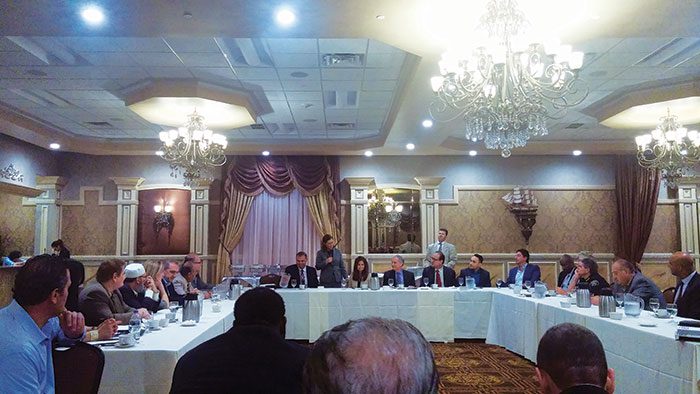
DEARBORN — At a BRIDGES meeting on Tuesday, June 18, representatives of the Arab American community rued the loss of the Arab International Festival after successive lawsuits brought by anti-Muslim protesters.
Building Respect in Diverse Groups to Enhance Sensitivity (BRIDGES) was formed shortly after 9/11, in an effort to increase cooperation between government agencies and local leaders and address the backlash against the Arab Americans in southeast Michigan.
BRIDGES still meets regularly to discuss community concerns with federal officials.
The festival, which took place the last weekend of June, was cancelled in 2013.
Nabih Ayad, the chairman of the Arab American Civil Rights League (ACRL), updated the delegates at the meeting on the latest developments on the lawsuit filed by anti-Muslim protesters against Wayne County.
The case is pending appeal at the Sixth Circuit Court of Appeals in Cincinnati. Ayad, who is representing the county in the case, said the anti-Muslim demonstrators had come to Dearborn to start problems at the festival.
At the 2012 festival, the Bible Believers, a Christian extremist group, held a severed pig’s head on a spike and displayed offensive signs, proclaiming “Islam Is A Religion of Blood and Murder” and calling the Prophet Mohamad a “pedophile.”
A crowd of youths offended by the fundamentalist group started throwing plastic bottles and rocks at the protesters, injuring their leader. That’s when Wayne County Sheriff’s deputies demanded the protesters leave or get ticketed.
The Bible Believers sued the county, but U.S. District Court Judge Patrick Duggan dismissed the lawsuit, ruling that deputies did not violate the protesters’ First Amendment rights and only intervened when the situation turned violent. In August, a three-judge panel at the Court of Appeals upheld the dismissal.
However, the court accepted the plaintiffs’ motion to reconsider and Ayad argued in front of a full courtroom last month that dismissing the demonstrators was a public safety concern.
Ayad said he expects the lawsuit to go all the way to the Supreme Court.
He said the festival was shut down after the controversies made it no longer economically feasible.
The city of Dearborn settled a $300,000 lawsuit for wrongfully arresting similar protesters at the festival in 2010. The highly publicized lawsuits drove insurance costs up.
“At the end of the day, it’s a detriment to the community; it’s a detriment to the families of the community; it’s a detriment to the children that use the Ferris wheel and go on the horse rides; and to the people who come to experience this wonderful event that had been happening for 13 years,” Ayad said.
He added that bigots were able to end the festival.
“It’s a shame that this happens,” Ayad said. “In essence, that is the true nature of what happens when these individuals take on this community and attack this community and use it as a scapegoat to preach their hate.”
Nasser Beydoun, the former executive director of the American Arab Chamber of Commerce, which organized the festival, said the insurance cost of the event went up from $1,200 to $50,000.
“To lose such a signature event, the community lost a lot,” Beydoun said. “This event would attract people from all over the region; we would bring in international artists; 300,000 people would walk through Warren [Avenue]. It is a tragedy that we lost such an event. That’s what hate does and that’s what they’re trying to do— silence us.”
Barbara McQuade, the U.S. attorney for the Eastern District of Michigan, saluted departing BRIDGES community co-chair Ali Hammoud and government co-chair Patricia Fantazian. Hammoud was replaced by Dr. Yahya Basha. The government, which selects the co-chair, is still searching for Fantazian’s successor.
During the meeting, McQuade addressed the U.S. Supreme Court’s ruling in favor of a Muslim woman who was denied a job at Abercrombie and Fitch because of her hijab.
“If you encounter any difficulties in the same manner, please let us know about it,” she said. “We’ll connect you with the EEOC. We want to make sure that we defend people’s rights. We also want to share this information and make sure that employers know about this law, so that they understand their duty to provide reasonable accommodation.”
The meeting also included a discussion about the use of informants by the government. Several federal officials assured attendees that agencies hold informants accountable for the information they provide to make sure that they don’t falsely accuse people of wrongdoing.
A heated debate arose when Ayad complained about the way Arab informants are treated by the government, bringing up the case of an informant who was placed on a deportation list after his cover was blown. Businessman Ali Jawad criticized Ayad for bringing up the issue, saying that BRIDGES is not the right platform to discuss specific cases.






Leave a Reply